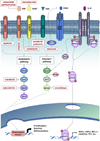Intrahepatic cholangiocarcinoma: pathogenesis and rationale for molecular therapies
- PMID: 23318457
- PMCID: PMC3718868
- DOI: 10.1038/onc.2012.617
Intrahepatic cholangiocarcinoma: pathogenesis and rationale for molecular therapies
Abstract
Intrahepatic cholangiocarcinoma (ICC) is an aggressive malignancy with very poor prognosis. Genome-wide, high-throughput technologies have made major advances in understanding the molecular basis of this disease, although important mechanisms are still unclear. Recent data have revealed specific genetic mutations (for example, KRAS, IDH1 and IDH2), epigenetic silencing, aberrant signaling pathway activation (for example, interleukin (IL)-6/signal transducer and activator of transcription 3 (STAT3), tyrosine kinase receptor-related pathways) and molecular subclasses with unique alterations (for example, proliferation and inflammation subclasses). In addition, some ICCs share common genomic traits with hepatocellular carcinoma. All this information provides the basis to explore novel targeted therapies. Currently, surgery at early stage is the only effective therapy. At more advanced stages, chemotherapy regimens are emerging (that is, cisplatin plus gemcitabine), along with molecular targeted agents tested in several ongoing clinical trials. Nonetheless, a first-line conclusive treatment remains an unmet need. Similarly, there are no studies assessing tumor response related with genetic alterations. This review explores the recent advancements in the knowledge of the molecular alterations underlying ICC and the future prospects in terms of therapeutic strategies leading towards a more personalized treatment of this neoplasm.
Figures


References
-
- Khan SA, Thomas HC, Davidson BR, Taylor-Robinson SD. Cholangiocarcinoma. Lancet. 2005;366:1303–1314. - PubMed
-
- Patel T. Increasing incidence and mortality of primary intrahepatic cholangiocarcinoma in the United States. Hepatology. 2001;33:1353–1357. - PubMed
-
- Shaib Y, El-Serag HB. The epidemiology of cholangiocarcinoma. Semin Liver Dis. 2004;24:115–125. - PubMed
Publication types
MeSH terms
Grants and funding
LinkOut - more resources
Full Text Sources
Other Literature Sources
Medical
Miscellaneous

